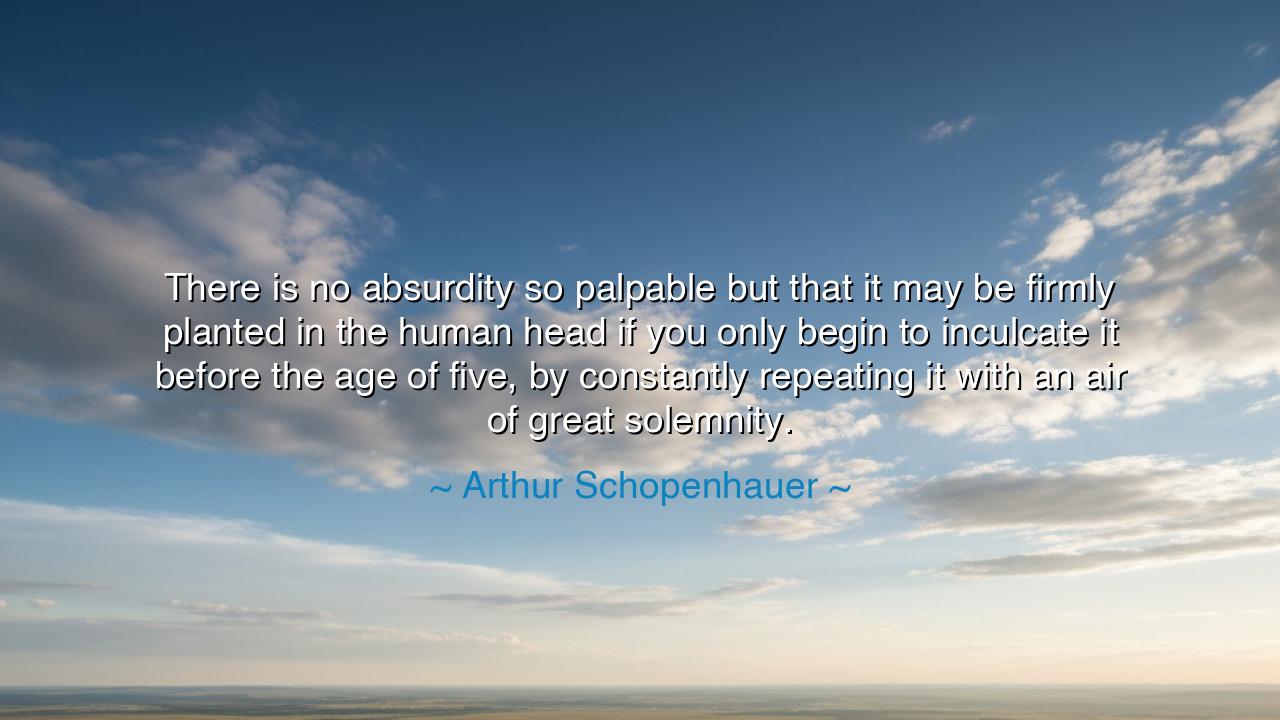
There is no absurdity so palpable but that it may be firmly
There is no absurdity so palpable but that it may be firmly planted in the human head if you only begin to inculcate it before the age of five, by constantly repeating it with an air of great solemnity.






In the ancient wisdom of the world, there lies a deep understanding of the power of belief—how the ideas we are taught, particularly in our early years, shape the very fabric of our reality. Arthur Schopenhauer, that great philosopher of the 19th century, speaks to this truth when he says, "There is no absurdity so palpable but that it may be firmly planted in the human head if you only begin to inculcate it before the age of five, by constantly repeating it with an air of great solemnity." These words carry a lesson as old as time itself: the power of early influence, and the formative years of a child, when their minds are like soft clay, easily molded and shaped by the hands of those around them.
Schopenhauer’s insight taps into a deep well of ancient wisdom. In many cultures, the elders understood the vital importance of early education. The mind of a young child is seen as a garden that can grow either beautiful flowers or poisonous weeds depending on the seeds that are planted within it. In ancient Greece, the great philosopher Plato emphasized the importance of teaching the young. He believed that if the mind of a child is fed with wisdom, justice, and beauty, it will grow into a noble and virtuous individual. Yet, if the seeds planted are of ignorance or falsehoods, the roots of these ideas would shape a person into something lesser. This is the warning Schopenhauer gives us—that absurdities, even the most palpable ones, can be cultivated if instilled in the young with enough repetition and solemnity.
The power of early conditioning is a force so strong that even the greatest minds can be deceived by it. In history, we see this in the rise of various ideologies—many of which have taken hold of societies simply because they were presented to the young with conviction. Take, for example, the rise of totalitarian regimes in the 20th century. Adolf Hitler and his followers understood the power of early indoctrination. They sought to mold the youth through repeated slogans and constant repetition of their beliefs, from early schooling to youth organizations. The young minds, unformed and impressionable, were told with great solemnity that their country’s future depended on their loyalty to a cause, and thus, a belief that was once absurd to many, became truth to them.
History teaches us that ideas, no matter how illogical or nonsensical, gain strength when they are taught with conviction from a young age. It is not merely the intellect that shapes a person's beliefs, but the repeated reinforcement of ideas that we are told to accept as truths. Religions, too, have risen and flourished not simply by the force of their doctrines, but by the early conditioning of the young. Those raised in a certain faith, having been taught the stories of gods and saints from their first days, grow into those beliefs, seeing them as truth. What might seem absurd to an outsider, becomes self-evident to those raised within that system.
The great lesson here is not one of cynicism, but of awareness—the understanding that we, as adults and teachers, hold immense responsibility in shaping the minds of the young. We must be ever-vigilant in the ideas we present to the children in our care, for their minds are malleable and impressionable. The absurdities of the world can be repeated in the name of tradition or authority, but we must guard against them. We must, instead, plant the seeds of truth, rationality, and wisdom in their hearts, helping them to grow into thinking, critical individuals who will not accept ideas simply because they are repeated with authority.
This wisdom is timeless. We must ask ourselves, what are we teaching the next generation? What ideas, what values, are we instilling in their minds? Are we repeating truths that have stood the test of time, or are we, perhaps, passing along absurdities—ideas born of fear, ignorance, or self-interest? The power of repetition is great, but so too is the responsibility we carry to ensure that what we repeat is worthy of the next generation's trust. The mind of a child is a sacred trust, and it is our duty to fill it not with falsehoods, but with the seeds of a future grounded in wisdom and understanding.
Thus, the lesson of Schopenhauer’s quote is clear: be mindful of the ideas you pass on, for they can take root in the hearts and minds of the young, shaping them in ways you may not foresee. The absurdities of the world can become truths if planted early enough, and they can grow with an air of solemnity. Let us strive to be guardians of truth, planting in the next generation not only the seeds of knowledge, but of wisdom, understanding, and critical thought, that they might be free to live a life based not on what they are told to believe, but on what they have the courage to discover for themselves.






AAdministratorAdministrator
Welcome, honored guests. Please leave a comment, we will respond soon